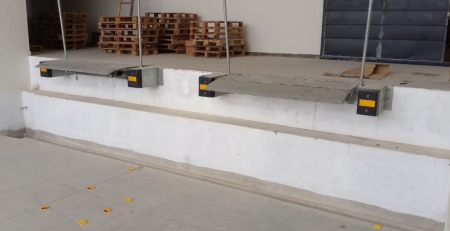Hydraulic vs. Mechanical Docks: Key Differences and Business Benefits!
When it comes to efficient cargo loading and freight management, selecting the right equipment can make all the difference. One critical decision is choosing between hydraulic and mechanical dock levelers. Both offer unique benefits tailored to specific operations. But which one is right for you? Let’s dive into a comprehensive comparison to help you make the right choice.
Understanding Dock Ramps
Dock Ramps fill the gap between a loading dock and a truck bed, ensuring smooth and safe cargo movement. These tools are important for businesses that depend on forklifts, manual labor, or both for loading and unloading operations.
There are two major types:
- Hydraulic Levelers – Automated systems powered by electricity and hydraulic pumps.
- Mechanical Levelers – Operated manually using springs and levers.
Your choice depends on your operational needs, budget, and the scale of your loading activities.
Hydraulic Docks: The Automated Advantage
Such levelers are designed to offer automation and ease, making cargo loading seamless. With a simple button push, these systems adjust the platform to the right height, saving time and manual effort. They are ideal for businesses aiming to enhance efficiency and reduce physical strain on operators, ensuring smooth and precise operations.
Crucial Factors to Consider
- Start it with a simple push button for easy operation.
- Controls the platform height and extends the lip with button commands.
- Automatically lowers the platform to the trailer floor when buttons are released.
- Operates within a range of 12 inches above or below dock height.
- Eliminates the need for chain pulling during regular use.
- Returns to its stored position with the press of a button after loading or unloading.
- Ergonomically designed to reduce worker strain and minimize injury risk by removing the need for bending and chain pulling.
- Comprises one motor, two cylinders, and a series of hoses for efficient functionality.
Why Choose Hydraulic Levelers?
Hydraulic systems bring several advantages, including enhanced safety with automated controls that minimize risks related to manual handling. They are perfect for high-capacity operations and handle heavy loads. With fewer moving parts, you don’t need to maintain it on a daily basis, and it is generally limited to components like seals and pumps. Additionally, the smooth operation of hydraulic levelers ensures stability and eliminates sudden jolts or drops. While the initial investment and reliance on a power supply may seem significant, the long-term benefits make them an excellent choice for large-scale, high-demand facilities.

Mechanical Docks: A Reliable Manual Solution
Manual ramps are a durable and cost-effective solution for businesses seeking simplicity and functionality without reliance on electricity. Operated using a system of springs and levers, they are an excellent choice for facilities. Their simple design ensures reliability, making them a practical option for businesses with basic loading dock needs.
Crucial Factors to Consider
- It operates with spring power and requires manual activation.
- The platform is lowered onto the trailer bed by the operator walking onto it and using body weight.
- To position it onto a trailer, the operator pulls a chain to release the “hold-down” system, allowing the platform to rise and the lip to extend.
- If the trailer is below docking height, a second chain must be drawn back to retract the support legs, enabling the platform to lower below the dock level.
- It offers less ergonomic efficiency than hydraulic levelers.
- Consists of springs, hold-downs, lip latches, and various moving parts. They remain under constant pressure and require frequent maintenance or replacement, especially the springs.
- Springs are sensitive to temperature changes, expanding in heat and contracting in cold, necessitating regular adjustments.
- It can load the capacity of up to 6 to 10 tons easily.
Why Opt for Mechanical Levelers?
Mechanical systems offer several benefits. It includes lower purchase and installation costs, making them ideal for businesses just starting out. Their power-free operation suits locations without reliable electricity, and their simple setup requires minimal resources. However, the manual effort required for operation can be challenging. Over time, components like springs and levers may need regular maintenance due to wear and tear, potentially increasing long-term operational costs.
Key Points Differentiate The Operations!
Making the right choice between hydraulic and mechanical dock levelers involves weighing your operational needs against costs. Here are the most important factors to think about:
- Frequency of Use: High-volume operations demand the efficiency and durability of hydraulic levelers.
- Budget Constraints: A mechanical leveler offers a cost-effective solution if you’re working within a tight budget.
- Power Accessibility: Facilities without reliable electricity are better suited for mechanical options.
- Maintenance Capacity: Hydraulic systems require less frequent servicing, but their components, like seals, may incur higher costs if repairs are needed.
Final Thoughts: Hydraulic or Mechanical?
Both mechanical and hydraulic dockies help fulfill the gap between trucks and loading docks, but the ideal choice depends on facility-specific needs. Facilities with fewer loading docks (1-2) may benefit from a mechanical dock leveler, while those with four or more docks should opt for a hydraulic one. Shipping frequency also matters—low activity suits mechanical levelers, while high traffic requires hydraulic efficiency. Additionally, hydraulic levelers accommodate varying truck heights more easily. Though mechanical levelers have lower upfront costs (30% less), long-term maintenance balances overall expenses.
Once you’ve decided on the right dock leveler, reach out to Mechatronix Solutions for a wide selection that is tailored to different needs. Whether for large-scale freight operations or smaller loading docks, our high-quality solutions prioritize safety and efficiency. Get in touch today for expert advice and discover the ideal dock leveler to optimize your loading dock operations.
Get A Dock Leveler For Your Warehouse!



